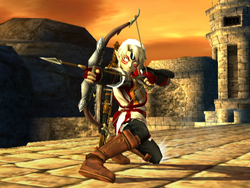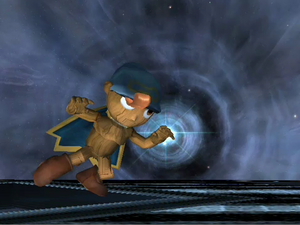File replacement: Difference between revisions
No edit summary |
BlindColours (talk | contribs) m (→Custom Music) |
||
| Line 25: | Line 25: | ||
==Custom Music== | ==Custom Music== | ||
Similar to Textures, music was initially limited to ISO users, although much later than textures. Custom music was popularized by GHNeko (One of the main developers of [[Brawl+]]), who made a video displaying various stages with custom music, although it was with ISO [http://www.youtube.com/watch?v=yJJ2WAsolGQ&feature=player_embedded]. Eventually Phantom Wings continued his file replacement code used for textures to incorporate music (the first post about it can be seen [http://board.gscentral.org/showthread.php?t=30533#22 here]). Custom music was initially very confusing to make, as users had to make the music into a .brstm file, loop in an acceptable manner, and have the proper settings, although Bionic Sonic created a tool that only required simple editing to accommodate various personal settings, mostly volume, in a music editing program, such as Audacity. A newer version | Similar to Textures, music was initially limited to ISO users, although much later than textures. Custom music was popularized by GHNeko (One of the main developers of [[Brawl+]]), who made a video displaying various stages with custom music, although it was with ISO [http://www.youtube.com/watch?v=yJJ2WAsolGQ&feature=player_embedded]. Eventually Phantom Wings continued his file replacement code used for textures to incorporate music (the first post about it can be seen [http://board.gscentral.org/showthread.php?t=30533#22 here]). Custom music was initially very confusing to make, as users had to make the music into a .brstm file, loop in an acceptable manner, and have the proper settings, although Bionic Sonic created a tool that only required simple editing to accommodate various personal settings, mostly volume, in a music editing program, such as Audacity. A newer version was released by Dantarion and a video can be seen [http://www.youtube.com/watch?v=hu-IT_-ULXc&annotation_id=annotation_781800&feature=iv here]. | ||
==Moveset Hacks (Project Smash Attacks\Plan Zero)== | ==Moveset Hacks (Project Smash Attacks\Plan Zero)== | ||
Revision as of 18:06, October 21, 2011
File Replacement is a general term used to describe replacing various elements of Super Smash Bros. Brawl, including textures, music, and even movesets. Phantom Wings is credited to expanding its popularity, as he made file replacement available to users using SD cards, as initially music and textures required ISO hacking.
Textures

- For a catalog of many available texture hacks, please visit Brawl Vault.
A Texture Hack is a hack used through the Homebrew Channel that alters a character's palette swap colors into different designs. This process was pioneered by Pharrox, a user on Smash World Forums. The hack involves the individual coding of the characters being changed to fit the design wanted. There are several websites dedicated to texture hacking.
The basis of most textures is to make a character(or stage etc.) appear similar to something else. Examples include changing a Pokémon's appearance to its shiny form, or making characters appear similar to newer characters from other games, such as making Meta Knight appear as Galactic Knight from Kirby Super Star Ultra, or Fierce Diety Link, seen to the right.
The project has eventually grown to incorporate stage textures, item textures, Final Smash textures (e.g., the artwork seen during Peach's Peach Blossom). Over time, the popularity of texture hacking has caused several other kinds of hacks to become available, such as music hacks, moveset hacks, and, eventually, model swapping, vertex hacks, custom animations, and even the insertion of completely new models.
Initially, blank DVDs were necessary in order to use texture hacks, but PhantomWings managed to create a hack, exploiting Brawl's use of data created and saved on an SD Card, that allowed for texture hacks to be stored on and loaded from folders on SD cards, making them much more popular and accessible. Now, the only thing required is an SD card, the Homebrew Channel, and program to load the codes and textures, commonly Gecko OS or Riivolution.
Primary Texture Hacking Teams

Possibly one of the most well-known and renowned hacking teams, ]Syntax Error[, the first texture hacking team, as well as the ones who released a guide to the masses on how to do texture hacking, was, unfortunately, broken up by their host site shortly after their releases for fear of a lawsuit from Nintendo. In reality, no lawsuit actually ever existed; it was only a safety precaution by the host site when they learned that ]Syntax Error[ had actually released their textures and guide to the public. Their host site believed that this release of hacks was a promotion of illegal piracy, when, in fact, Syntax Error did not promote piracy at all and actually refused to give out Brawl's ISO for the hacks, which could also be inadvertently used for piracy. Their textures, which had been released for a very short time prior to their being shut down, were given to the Stack Smash team, who placed them in a separate file on their [Index of /STUFFZ/]. Their being broken up by their host site for fear of legal issues has caused the team to become a kind of martyr in the Smash hacking community, and has caused many to push hacking farther than ever before, even expanding the concept into Melee, which was previously thought to be much more resilient to possible hacks, especially texture replacements and the like.
Custom Music
Similar to Textures, music was initially limited to ISO users, although much later than textures. Custom music was popularized by GHNeko (One of the main developers of Brawl+), who made a video displaying various stages with custom music, although it was with ISO [1]. Eventually Phantom Wings continued his file replacement code used for textures to incorporate music (the first post about it can be seen here). Custom music was initially very confusing to make, as users had to make the music into a .brstm file, loop in an acceptable manner, and have the proper settings, although Bionic Sonic created a tool that only required simple editing to accommodate various personal settings, mostly volume, in a music editing program, such as Audacity. A newer version was released by Dantarion and a video can be seen here.
Moveset Hacks (Project Smash Attacks\Plan Zero)
Created by Phantom Wings, Moveset Hacks (known as Project Smash Attacks) allow one to edit a character's moveset to create their own. Although understanding of scripts and floating values are necessary, it has been described as simple to those who do understand it, and several users on smashworld forums and various hacking sites have tried to make simple guides for those who don't. Many movesets have been made, although the first one, made by Phantom Wings, known as Phoenix Mario, was the first one to be unveiled at Brawlhacks Wiki under the name Plan Zero. Phoenix Mario, although maybe not the most popular moveset hack, is or was the most widely-used around the time of the release of Project Smash Attacks.
An example of a moveset hack is that of Cloud Strife from the popular Final Fantasy series. His appearance is most well known on Kitty Corp: Meow Mix, but the model was designed by Akari_Un from a lesser-sized team called Das Donkey. The moveset was added by a hacker named .Fade, and the animations designed mostly by Canon, both of which are members of the Kitty Corp: Meow Mix team.
Other projects similar to this one have cropped up. Kitty Corp: Meow Mix normally creates hacks that will please mass amounts of people at a time, with large fanbases already in place. While not a moveset hack yet, an example of this is clearly apparent by the creation of Master Chief over Captain Falcon. More info on that can be found inside of BrawlVault], the largest repository of Brawl hacks online. BrawlVault was designed by Picano and Jack H., the current leaders of Kitty Corp: Meow Mix.
